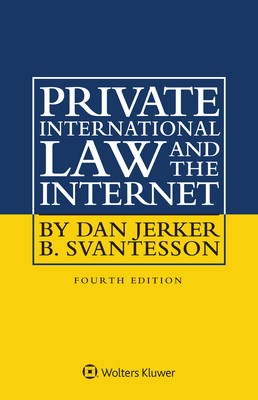
- Išsiųsime per 10–14 d.d.
- Autorius: Dan Jerker B Svantesson
- Leidėjas: Kluwer Law International
- ISBN-10: 9403511354
- ISBN-13: 9789403511351
- Formatas: 15.6 x 23.4 x 4.5 cm, kieti viršeliai
- Kalba: Anglų
- Extra -15 % nuolaida šiai knygai su kodu: ENG15
Private International Law and the Internet + nemokamas atvežimas! | knygos.lt
Atsiliepimai
Aprašymas
In this, the fourth edition of Private International Law and the Internet, Professor Dan Svantesson provides a detailed and insightful account of what has emerged as the most crucial current issue in private international law; that is, how the Internet affects and is affected by the five fundamental questions: When should a lawsuit be entertained by the courts? Which state's law should be applied? When should a court that can entertain a lawsuit decline to do so? How wide 'scope of jurisdiction' should be afforded to a court with jurisdiction over a dispute? And will a judgment rendered in one country be recognized and enforced in another?
Professor Svantesson identifies and investigates twelve characteristics of Internet communication that are relevant to these questions and then proceeds with a detailed discussion of what is required of modern private international law rules.
Focus is placed on several issues that have far-reaching practical consequences in the Internet context, including the following:
- cross-border defamation;
- cross-border business contracts;
- cross-border consumer contracts; and
- cross-border intellectual property issues.
A wide survey of private international law solutions encompasses insightful and timely analyses of relevant laws adopted in a variety of jurisdictions, including Australia, England, Hong Kong SAR, the United States, Germany, Sweden, and China, as well as in a range of international instruments. There is also a chapter on advances in geo-identification technologies and their special value for legal practice. The book concludes with two model international conventions, one on cross-border defamation and one on cross-border contracts, as well as a set of practical checklists to guide legal practitioners faced with cross-border matters within the discussed fields.
Professor Svantesson's book brings together a wealth of research findings in the overlapping disciplines of law and technology that will be of particular utility to practitioners and academics working in this complex and rapidly changing field. His thoughtful analysis of the interplay of the developing Internet and private international law will also be of great value, as will the tools he offers with which to anticipate the future. Private International Law and the Internet provides a remarkable stimulus to continue working towards globally acceptable private international law rules for communication via the Internet.
EXTRA 15 % nuolaida su kodu: ENG15
Akcija baigiasi už 6d.10:28:29
Nuolaidos kodas galioja perkant nuo 10 €. Nuolaidos nesumuojamos.

- Autorius: Dan Jerker B Svantesson
- Leidėjas: Kluwer Law International
- ISBN-10: 9403511354
- ISBN-13: 9789403511351
- Formatas: 15.6 x 23.4 x 4.5 cm, kieti viršeliai
- Kalba: Anglų
In this, the fourth edition of Private International Law and the Internet, Professor Dan Svantesson provides a detailed and insightful account of what has emerged as the most crucial current issue in private international law; that is, how the Internet affects and is affected by the five fundamental questions: When should a lawsuit be entertained by the courts? Which state's law should be applied? When should a court that can entertain a lawsuit decline to do so? How wide 'scope of jurisdiction' should be afforded to a court with jurisdiction over a dispute? And will a judgment rendered in one country be recognized and enforced in another?
Professor Svantesson identifies and investigates twelve characteristics of Internet communication that are relevant to these questions and then proceeds with a detailed discussion of what is required of modern private international law rules.
Focus is placed on several issues that have far-reaching practical consequences in the Internet context, including the following:
- cross-border defamation;
- cross-border business contracts;
- cross-border consumer contracts; and
- cross-border intellectual property issues.
A wide survey of private international law solutions encompasses insightful and timely analyses of relevant laws adopted in a variety of jurisdictions, including Australia, England, Hong Kong SAR, the United States, Germany, Sweden, and China, as well as in a range of international instruments. There is also a chapter on advances in geo-identification technologies and their special value for legal practice. The book concludes with two model international conventions, one on cross-border defamation and one on cross-border contracts, as well as a set of practical checklists to guide legal practitioners faced with cross-border matters within the discussed fields.
Professor Svantesson's book brings together a wealth of research findings in the overlapping disciplines of law and technology that will be of particular utility to practitioners and academics working in this complex and rapidly changing field. His thoughtful analysis of the interplay of the developing Internet and private international law will also be of great value, as will the tools he offers with which to anticipate the future. Private International Law and the Internet provides a remarkable stimulus to continue working towards globally acceptable private international law rules for communication via the Internet.




Atsiliepimai